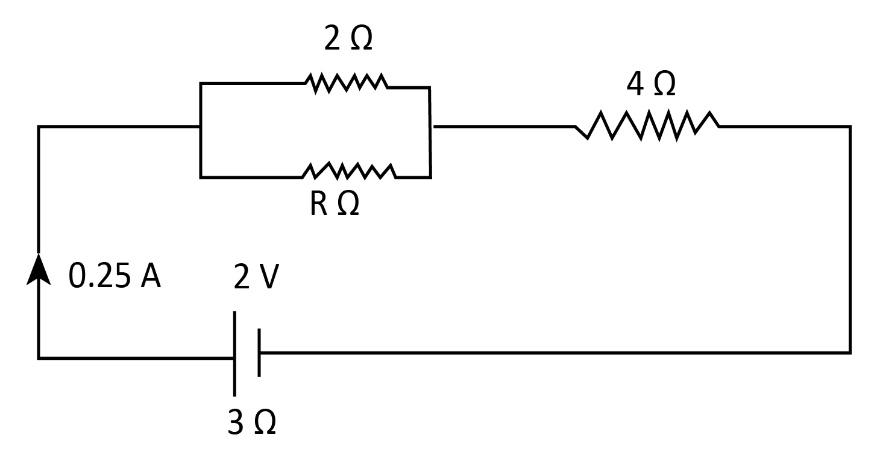Question
Question: The circuit diagram in Fig. 8.53 shows three resistors \(2\;\Omega \), \(4\;\Omega \) and \(R\;\Omeg...
The circuit diagram in Fig. 8.53 shows three resistors 2Ω, 4Ω and RΩ connected to a battery of e.m.f. 2V and internal resistance 3Ω. If main current of 0.25A flows through the circuit, find:
(a) the p.d. across the 4Ω resistor,
(b) the p.d. across the internal resistance of the cell
(c) the p.d. across the RΩ or 2Ω resistor, and
(d) the value of R.

Solution
In this question, we will use Ohm’s law equation for finding voltage, current or resistance. We will also identify the resistances connected in series and in parallel to find the values of electric quantities.
Complete step by step answer:
Given,
Emf of the battery, E=2V
Internal resistance of the battery, r=3Ω
Main current flowing through the circuit, I=0.25A
Also, let R1=2Ω, R2=4Ω and R3=RΩ.
(a) The p.d. across the resistance R2=4Ω can be written as
V2=IR2
Here V2 is the p.d. across R2.
Now we substitute the values 0.25A for I and 4Ω for R2 in the equation to get,
V2=0.25×4 =1V
Hence, the p.d. across the resistance R2 is 1V.
(b) The p.d. across the internal resistance r of the cell can be written as
V=Ir
Now we substitute the values 0.25A for I and 3Ω for r in the equation to get,
V=0.25×3 =0.75V
Hence, the p.d. across the internal resistance of the cell is 0.75V.
(c) From the circuit diagram, we can see that the resistances R1=2Ω and R3=RΩ are connected in parallel. Also, we can see that the resistance R2=4Ω is in series with the parallel combination of resistances R1 and R3.
Now we have to find the equivalent resistance of the resistances R1 and R3. The equivalent resistance is written as
Rp=R1+R3R1R3
Since the internal resistance of the cell r and the resistance R2 is in series with the parallel combination of resistances R1 and R3, we can write the equivalent resistance of the circuit as
Req=r+R2+Rp =r+R2+R1+R3R1R3
Substituting the values of r, R1, R2 and R3 in the above equation, we get
Req=3+4+2+R2×R =7+2+R2R =2+R14+7R+2R =2+R14+9R
Now, the emf of the battery can be written as
E=IReq
Now we substitute 2V for E, 0.25A for I and 2+R14+9R for Req to get,
2=0.25×(2+R14+9R) ⟹2=41(2+R14+9R) ⟹2=8+4R14+9R ⟹2(8+4R)=14+9R
Simplifying further
16+8R=14+9R R=2Ω
So, we obtained the value of R as 2Ω.
Now, the p.d. across R1=2Ω or R3=RΩ can be written as
V1=IRp
Now, using the equation Rp=R1+R3R1R3 we can write
V1=I(R1+R3R1R3)
Now, we substitute the values for I, R1 and R3 in the above equation to get
V1=0.25×(2+22×2) =0.25V
Hence, the p.d. across the RΩ or 2Ω resistor is 0.25V.m (d) From subpart (c), the value of R is 2Ω..
Note:
We should note that the voltage across the resistances connected in series are different, while the current flowing through each of them will be the same. For resistances connected in parallel, the voltage across each of them will be the same, while the current is different.
